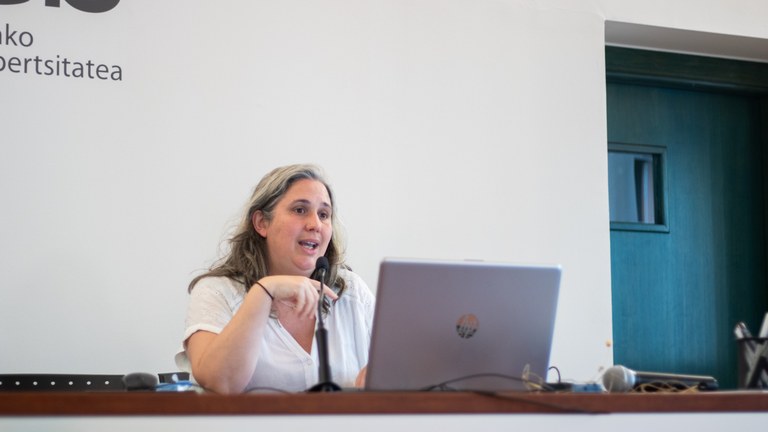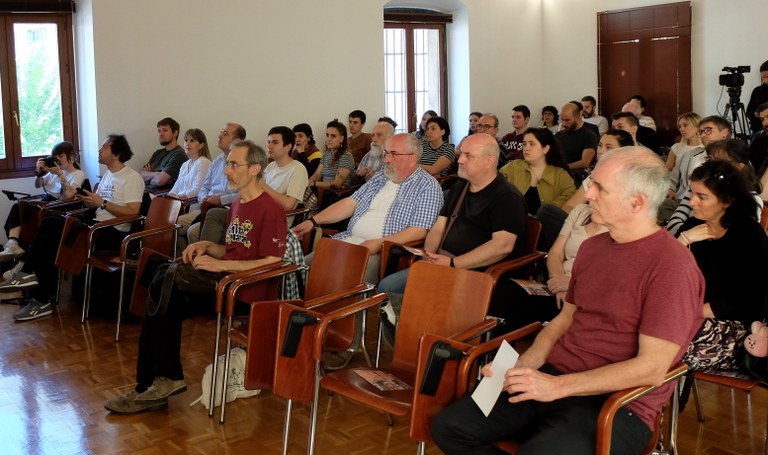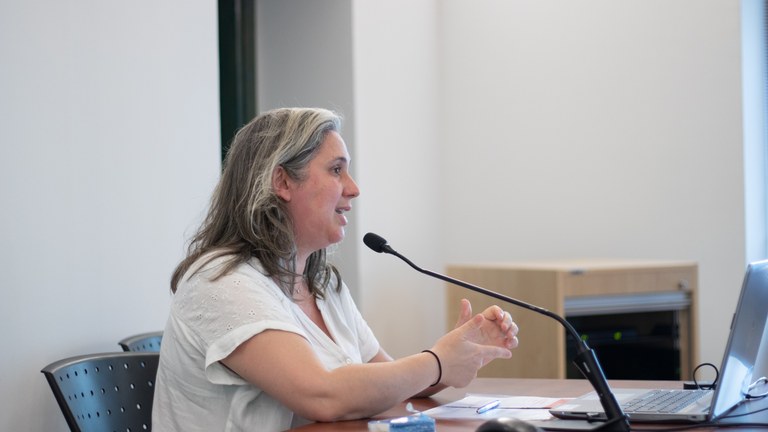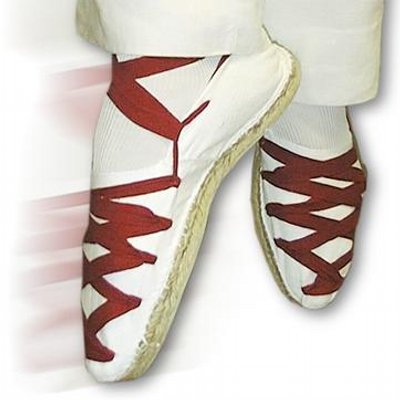First steps for the Basque Dance Diploma in Iparralde
- In recent years there has been an increase in the presence of Euskera and traditional disciplines in the Lapurdi Conservatory and the trajectory of Basque dance is being shaped. “In Iparralde the Herri Elkargoa was created and wanted to develop the department of popular music and popular dance. For this purpose they have created two positions three years ago and at that time I entered the conservatory”, Marie Hirigoien explained to us in the Dantzan Ikasi meetings the intentions and projects that they carry with them in the conservatory Maurice Ravel. “We can say that it is a great time to move things forward politically and in it we are creating and developing things, giving room to the Basque Country and the Basque culture.”

Creating the Basque dance route
The jobs of the txistu and singing teachers were fired first and now, although it is not for the whole day, they have also entered the drum and the txalaparta. On the other hand, in the trikitixa there was the possibility of conducting higher studies with professors from other places, and this year there will be a new position in the trikitixa. In this way, they intend to develop the dance journey as it has developed in recent years in music.

To do this, one has to take into account the level of the conservatory, “in France the conservatories have a level: that of the people, that of the popular community, that of the department… there are different levels and that of the North has a higher level”. Seven years ago, however, they were informed that to continue on that level they lacked the theater section and the third dance theme. “He was a classic and contemporary and needed to develop a third discipline.”
As the third theme was the introduction of traditional dance, “the Ministry has implied that seven years ago the third discipline of Basque dance and dance that was included in the example was needed. That’s a great novelty, and so we have the permission that they wrote politically 2-3 years ago.” Having created the jobs and obtained political authorization, two years ago they began working with IDB and EKE on the path of Basque dance.
The first cycle starts in September
Three cycles are planned: the first for primary school students, the second for ESO students and the third for baccalaureate students.
In September they began with the first cycle, “the goal is to create in a school, and there we make a link with the schools, to create a class to learn the first cycle in dance and in Basque music.” He points out that it is important for them to unite dance and music, since the situation of each discipline is very different, “music schools are organized by countries and are groups of Basque dances, in music there are diplomas, in dance no. There's a big difference, but everybody says they're united. We thought that if something emerges, the week is great from the start.”
He has also explained the possibility of learning levels with a very useful and effective adapted schedule, “in a class of fifteen students have the opportunity to learn music or dance from the second or third year. They have one or two afternoons and leave school and follow their studies with a professor at the conservatory.” It's not an add-on or an after-school activity, they do it during school hours.
“We will start putting it on the ground starting in September and the goal is to start with a class this year, it will be the two when they come and in three years everything will be established. And then the schools normally open these classes with the students of the ESO and it is possible to follow the first and second cycles.”
Zabala module assimilable to the second cycle
To explain the second cycle, Hirigoien has related it to the Zabala module. The Zabala module was a project between EKE, IDB and the conservatory, which began ten years ago, “some children danced in the villages, but some wanted to practice more than an hour, go further, learn more techniques. Therefore, a module was proposed in the conservatory where students have reached three hours”.

An hour and a half of Basque dances and another hour and a half of contemporary dance, “in those classes there is someone who works in the conservatory, is linked to the company Bilaka for three years and there were people from outside to teach techniques from the surrounding area: Gipuzkoa, Bizkaia, Zuberoa... dances.”
The Zabala module will be maintained for the time being, but the goal is that it be a second cycle and that non-conservative studies also enter it, “for us it is very important not only music and dance in the conservatory, but we also maintain a link with dance groups and with the things they do in the village”. To do this they have created an agreement with IDB and have included in the programme some hours they have to do outside: in groups, in spectacular, in kaskarotak...
Last step: third cycle, Basque dance diploma
The goal is to create this third cycle that does not exist in the conservatory, “we have created a pedagogical model that guarantees the connection with the dance groups of the locality. Everyone will learn and count the dance in their people.” They will receive classes of Basque dance or inside the conservatory, as well as contemporary, classical and baroque dance.
However, he has insisted on the importance of participating in shows and initiatives outside the conservatories, to which they should finally promote the creation of an artistic project: “Context matters, not the creation of artificial things. That in their peoples they can also mount something that makes sense in culture and in participation.” Today we have to pass the tests in the music, “we have confirmed with the direction to take it away and to tell the things that they present artistically, their evaluation will be in it and not out of context, in the conservatory, with the judges”.

Risks and concerns
Until now, traditional Basque dance does not exist in diplomas, there has been a decree and normally a law will come out. Urbanika says years have gone by thinking that it was very important to have a diploma for the training of teachers, to remove the precariousness of the teachers of the groups of the people, to have a status ... but he realizes that there are risks in that path: “they want to create the diploma according to the decree, but then they say that it is necessary to have the diploma and if there are teachers who do not have to pay the diplomas.”
He believes that this can be a disaster in view of the conditions and functioning of the dance groups. He says that some have started fighting to distinguish two categories: “The diploma of conservatories is very good for the professionalization of some groups, but also the authorization for small towns and without problems working with the state”.
Opening doors step by step
Little by little they are taking steps and although they are aware of the problems that may arise, it is positive that “the director of the conservatory, although he is not here, understands where he is and what our problems are. And they follow us in our proposals.” And they have usually created a pedagogy that is not in national diplomas, “it’s important because there are a lot of people who don’t have the key, but if things are advanced, we’ll talk differently in a short time.” And he wanted to bring to the table some of the advances made: immersion courses in companies, festivals, masterclass, classes and exams in Basque...
The idea that we in the dance world often repeat is that dance is ephemeral. The Elhuyar dictionary gives as a counterpart to "ephemeral" English: ephemeral, destructive, perishable, ephemeral, ephemeral, perishable, perishable, ilaun. I don't remember who I first read that idea... [+]
Transmisioa eta dantza taldeetako erreleboa aztertu nahi izan dugu Dantzan Ikasi topaketetan, eta gazte belaunaldiek lan egiteko ereduak ezagutu nahi izan ditugu “Gazteen parte-hartzea euskal dantzan” mahai inguruan: Eder Niño Barakaldoko... [+]
Aste hondar honetan euskal dantzen hiriburu bilakatu da Hendaia. Akelarre dantza talde hendaiarraren 50. urtemugaren testuinguruan, Lapurdi, Baxe Nafarroa eta Xiberoako hamasei dantza talde elkartu ditu bertan Iparraldeko Dantzarien Biltzarrak.





















